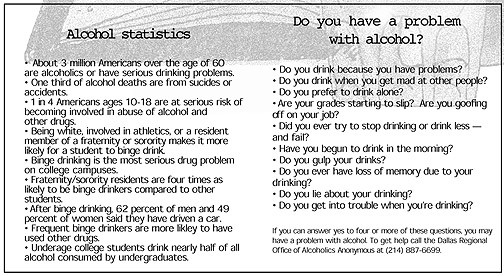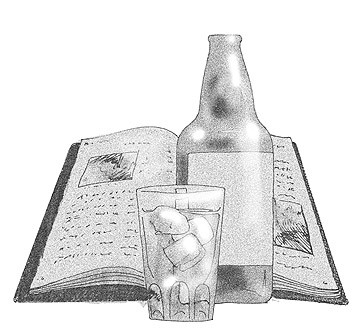
Under the influence
Kristina S. remembers being drunk from the beginning of the spring semester of her first year until nearly the end of her sophomore year at the University of Texas at Austin.
She bounced from party to party, drank until she passed out and had a few drinks in the morning to get her system started for class. She spent all day thinking about where her next drink would come from.
“I really let it start to control my life,” she said. “Looking back now, I have a hard time remembering what went on in those months and why I did half of the things I do remember.”
However, it wasn’t until she spent a few nights in jail after an arrest in Austin for a minor-in-possession charge, being publicly intoxicated and assaulting an officer that Kristina sobered up enough to realize her drinking was out of control.
After her release, Kristina moved into a halfway house for recovering alcoholics in Dallas. She has since joined a growing number of college students who are looking to organizations such as Alcoholics Anonymous in order to help them control their alcoholism.
“I would estimate that 15 to 20 percent of the members in the meetings that I attend are college-age kids,” said Bob F., a recovering alcoholic and volunteer in Alcoholics Anonymous’ regional office in Dallas. “We have people ranging in age from as young as 12 or 13 to almost 90.”
The only requirement to join Alcoholics Anonymous is a desire to quit drinking. There are no fees or dues.
“The way I look at it, we’ve all already paid our dues,” said Curt W. of the Preston Group, a local Alcoholics Anonymous chapter that meets every night of the week.
The organization was founded around a 12-step program that emphasizes accepting an outside spiritual force and meetings in which members are encouraged to be completely honest about past and current struggles with alcohol.
Because of its proximity to SMU, Curt said that a lot of students and faculty attend their meetings. However, he is hesitant to assign blame to the special stresses of a college atmosphere for alcoholism on campus.
“Alcoholism is not caused by problems from the outside,” he said. “They are only excuses. Alcoholism causes these problems.”
However, critics such as Charles Bufe, author of the book Alcoholics Anonymous: Cult or Cure?, argue that the program is cult-like and its spiritually driven 12-step program brainwashes its members.
“Well, whatever it took, it’s working,” Bob said. “I’d been to doctors and psychiatrists to get help with my drinking, and none of it worked. I finally just gave up and was ready to listen.”
Bob and Curt suggest that the curious attend an open meeting at one of the area chapters to learn about the organization even if they are not alcoholics.
“You don’t have to share or say anything. Just go and listen to see if there’s something common to your experience,” Bob said. “It’s a great help to see that there are other people who are helping each other and have a plan for controlling their alcoholism.”
That was the decision Kristina made a year ago when she first moved to Dallas. Her cravings for alcohol haven’t gone away, but with the support of her Alcoholics Anonymous group, she is sure she can manage her problem. Now, as she climbs the stairs next to the Cork and Bottle Liquor Store on her way to her weekly meeting, she doesn’t even turn her head. She has been sober for 366 days.
– Because of Alcoholics Anonymous’s policy of keeping member’s identity a secret, all members were only able to provide their first name and the last initial.

Under the influence








